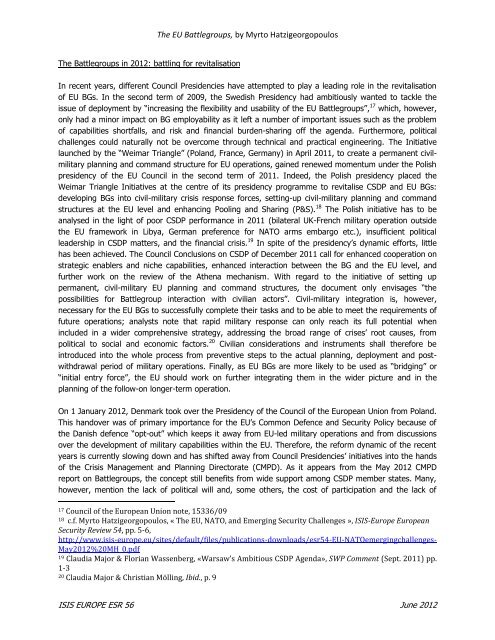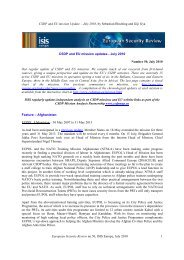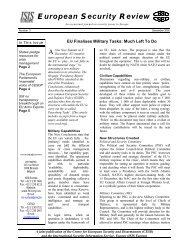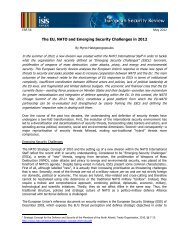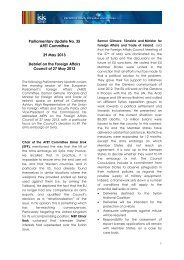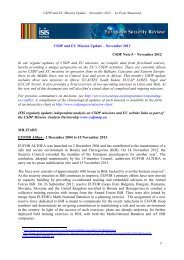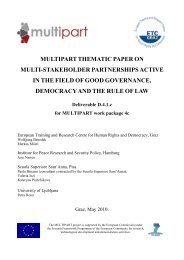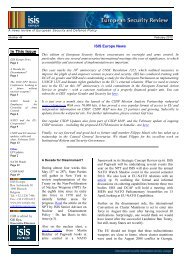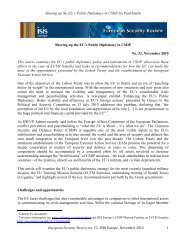the role of eu battlegroups for european defence - ISIS Europe
the role of eu battlegroups for european defence - ISIS Europe
the role of eu battlegroups for european defence - ISIS Europe
Create successful ePaper yourself
Turn your PDF publications into a flip-book with our unique Google optimized e-Paper software.
The EU Battlegroups, by Myrto Hatzigeorgopoulos<br />
The Battlegroups in 2012: battling <strong>for</strong> revitalisation<br />
In recent years, different Council Presidencies have attempted to play a leading <strong>role</strong> in <strong>the</strong> revitalisation<br />
<strong>of</strong> EU BGs. In <strong>the</strong> second term <strong>of</strong> 2009, <strong>the</strong> Swedish Presidency had ambitiously wanted to tackle <strong>the</strong><br />
issue <strong>of</strong> deployment by “increasing <strong>the</strong> flexibility and usability <strong>of</strong> <strong>the</strong> EU Battlegroups”, 17 which, however,<br />
only had a minor impact on BG employability as it left a number <strong>of</strong> important issues such as <strong>the</strong> problem<br />
<strong>of</strong> capabilities shortfalls, and risk and financial burden-sharing <strong>of</strong>f <strong>the</strong> agenda. Fur<strong>the</strong>rmore, political<br />
challenges could naturally not be overcome through technical and practical engineering. The Initiative<br />
launched by <strong>the</strong> “Weimar Triangle” (Poland, France, Germany) in April 2011, to create a permanent civilmilitary<br />
planning and command structure <strong>for</strong> EU operations, gained renewed momentum under <strong>the</strong> Polish<br />
presidency <strong>of</strong> <strong>the</strong> EU Council in <strong>the</strong> second term <strong>of</strong> 2011. Indeed, <strong>the</strong> Polish presidency placed <strong>the</strong><br />
Weimar Triangle Initiatives at <strong>the</strong> centre <strong>of</strong> its presidency programme to revitalise CSDP and EU BGs:<br />
developing BGs into civil-military crisis response <strong>for</strong>ces, setting-up civil-military planning and command<br />
structures at <strong>the</strong> EU level and enhancing Pooling and Sharing (P&S). 18 The Polish initiative has to be<br />
analysed in <strong>the</strong> light <strong>of</strong> poor CSDP per<strong>for</strong>mance in 2011 (bilateral UK-French military operation outside<br />
<strong>the</strong> EU framework in Libya, German preference <strong>for</strong> NATO arms embargo etc.), insufficient political<br />
leadership in CSDP matters, and <strong>the</strong> financial crisis. 19 In spite <strong>of</strong> <strong>the</strong> presidency’s dynamic ef<strong>for</strong>ts, little<br />
has been achieved. The Council Conclusions on CSDP <strong>of</strong> December 2011 call <strong>for</strong> enhanced cooperation on<br />
strategic enablers and niche capabilities, enhanced interaction between <strong>the</strong> BG and <strong>the</strong> EU level, and<br />
fur<strong>the</strong>r work on <strong>the</strong> review <strong>of</strong> <strong>the</strong> A<strong>the</strong>na mechanism. With regard to <strong>the</strong> initiative <strong>of</strong> setting up<br />
permanent, civil-military EU planning and command structures, <strong>the</strong> document only envisages “<strong>the</strong><br />
possibilities <strong>for</strong> Battlegroup interaction with civilian actors”. Civil-military integration is, however,<br />
necessary <strong>for</strong> <strong>the</strong> EU BGs to successfully complete <strong>the</strong>ir tasks and to be able to meet <strong>the</strong> requirements <strong>of</strong><br />
future operations; analysts note that rapid military response can only reach its full potential when<br />
included in a wider comprehensive strategy, addressing <strong>the</strong> broad range <strong>of</strong> crises’ root causes, from<br />
political to social and economic factors. 20 Civilian considerations and instruments shall <strong>the</strong>re<strong>for</strong>e be<br />
introduced into <strong>the</strong> whole process from preventive steps to <strong>the</strong> actual planning, deployment and postwithdrawal<br />
period <strong>of</strong> military operations. Finally, as EU BGs are more likely to be used as “bridging” or<br />
“initial entry <strong>for</strong>ce”, <strong>the</strong> EU should work on fur<strong>the</strong>r integrating <strong>the</strong>m in <strong>the</strong> wider picture and in <strong>the</strong><br />
planning <strong>of</strong> <strong>the</strong> follow-on longer-term operation.<br />
On 1 January 2012, Denmark took over <strong>the</strong> Presidency <strong>of</strong> <strong>the</strong> Council <strong>of</strong> <strong>the</strong> <strong>Europe</strong>an Union from Poland.<br />
This handover was <strong>of</strong> primary importance <strong>for</strong> <strong>the</strong> EU’s Common Defence and Security Policy because <strong>of</strong><br />
<strong>the</strong> Danish <strong>defence</strong> “opt-out” which keeps it away from EU-led military operations and from discussions<br />
over <strong>the</strong> development <strong>of</strong> military capabilities within <strong>the</strong> EU. There<strong>for</strong>e, <strong>the</strong> re<strong>for</strong>m dynamic <strong>of</strong> <strong>the</strong> recent<br />
years is currently slowing down and has shifted away from Council Presidencies’ initiatives into <strong>the</strong> hands<br />
<strong>of</strong> <strong>the</strong> Crisis Management and Planning Directorate (CMPD). As it appears from <strong>the</strong> May 2012 CMPD<br />
report on Battlegroups, <strong>the</strong> concept still benefits from wide support among CSDP member states. Many,<br />
however, mention <strong>the</strong> lack <strong>of</strong> political will and, some o<strong>the</strong>rs, <strong>the</strong> cost <strong>of</strong> participation and <strong>the</strong> lack <strong>of</strong><br />
17 Council <strong>of</strong> <strong>the</strong> <strong>Europe</strong>an Union note, 15336/09<br />
18 c.f. Myrto Hatzigeorgopoulos, « The EU, NATO, and Emerging Security Challenges », <strong>ISIS</strong>-<strong>Europe</strong> <strong>Europe</strong>an<br />
Security Review 54, pp. 5-6,<br />
http://www.isis-<strong>eu</strong>rope.<strong>eu</strong>/sites/default/files/publications-downloads/esr54-EU-NATOemergingchallenges-<br />
May2012%20MH_0.pdf<br />
19 Claudia Major & Florian Wassenberg, «Warsaw’s Ambitious CSDP Agenda», SWP Comment (Sept. 2011) pp.<br />
1-3<br />
20 Claudia Major & Christian Mölling, Ibid., p. 9<br />
<strong>ISIS</strong> EUROPE ESR 56 June 2012


